IMDb RATING
7.6/10
5.6K
YOUR RATING
When an aging activist is arrested, the lives of the accused, the lawyers, and the judge intertwine to reveal bigotry that underscores the judicial system.When an aging activist is arrested, the lives of the accused, the lawyers, and the judge intertwine to reveal bigotry that underscores the judicial system.When an aging activist is arrested, the lives of the accused, the lawyers, and the judge intertwine to reveal bigotry that underscores the judicial system.
- Awards
- 21 wins & 10 nominations total
Sukhdas Suryawanshi
- Sukhdev (court staff)
- (as Sukhdas Suryawamshi)
- Director
- Writer
- All cast & crew
- Production, box office & more at IMDbPro
Featured reviews
An avid Hindi film lover has a quite interesting but unreal picture of an Indian courtroom in his mind full of phrases such as My Lord, Judge Sahib, Objection sustained, Objection Overruled, Order Order, Mere Kaabil Dost, Mr. Public Prosecutor, Case Ki Agli Sunvaayi, Tareekh Pe Tareekh and many more.
However the truth remains shockingly contradicting to the on screen presentation and that's exactly what you get to witness in Chaitanya Tamhane's exceptional directorial debut in Marathi Cinema having an interesting cast ensemble and an explosive subject. Based on a completely unbelievable case filed by the State against an old age artist, admittedly the film takes its own times to influence the viewers with a slow paced story progression, resembling the way court cases keep crawling in India till years or even decades. But remaining within this off-beat framework, COURT also makes you feel many painful blows one after another while watching the case proceedings in a strange state of amazement. And further paints a hugely upsetting picture of our present Police and Judicial system forcing you to wonder that how come this brutally honest film was awarded a National recognition by the Government of India itself ..instead of getting banned.
To make your realize the mistake you would be committing by missing it, here are its major exceptional features that might influence you to change your mind and watch it at the earliest in the coming days.
1. You must have seen many films revolving around a false case being filed by the Police officials against an innocent person. But can you believe the height of absurdity when an investigating officer files a case against a 65 years old revolutionary social activist/artist/writer/singer, with a charge that one of his songs talking about suicide, provoked a poor sewage worker to kill himself by getting drowned in the gutter full of hazardous gases.
2. The case not only gets duly filed by presenting more than one witnesses, but it also gets extensively discussed within the court with the lady lawyer reading out many long pages full of false accusations adding a fine touch of black humour that instantly makes you laugh at the absurdity being practiced within the court itself.
3. The sequences bravely expose the flaws in our police and judiciary system when the police officer has no clues about a letter and existence of one crucial witness but still tries to defend his irresponsible actions so casually. Besides one feels disgustingly surprised when the honourable judge refuses to hear the next case as the lady coming forward is wearing a sleeveless dress that is considered to be disrespectful attire in a court room.
4. Through its various references of the weird case and personal lives of both the lawyers fighting it spiritedly, COURT also mocks at the widely prevalent class divide in our society and issues such as freedom of expression, fake arrests and exploitation of laws by the lawyers themselves ignoring the innocent lives and families being affected severely.
5. The language is a mix of Marathi, English, Hindi and Gujarati too, exactly like you find in the region of Mumbai. Reading the above features, you can easily guess that COURT is a rare thought provoking treat coming from our Regional Indian Cinema.
So just go for it at the earliest and don't miss many small but important real life insertions in its brilliant on screen execution such as:
A. The way the lawyer's parents treat a stranger visiting their house, who happens to be their son's client.
B. The strange, unconcerned kind of attitude in the answers given by the dead worker's widow in the court, who later refuses to take any money as help but asks for some work from the lawyer dropping her home.
C. The particular shot of a printing press, where the police officer arrives to arrest the artist checking his new book being printed, but the press worker sitting just a few feet away continues with his work of compiling a magazine pages showing no concern at all.
D. Just study the way, most of the film has been shot with all still frames with the camera placed in a single position making it more real as if one is sitting right there in the theater witnessing the court's proceedings.
E. And then, many shots continuing to a much longer duration than required with nothing happening on the screen, results in the viewer feeling more involved with the characters and their helpless plight.
In the performances, all inspiring actors (non-professionals mostly) provide a big support to the film led by Vivek Gomber as the defence attorney (also the film's producer), Geetanjali Kulkarni as the public prosecutor, Vira Sathidar as the accused artist/social activist and Pradeep Joshi as the judge. But the choice of other non-actors appearing in very short roles throughout the film could have been better.
The film ends with the final 10 minutes revolving around the judge alone and the stress he feels, leaving the viewers with many uncomfortable and horrifying questions about the court-procedures running in their minds. And perhaps the climax (showing him enjoying a picnic with his family, slapping one of the kids for disturbing his sleep), also wishes to present a possible conclusion that after all even a judge is a human too who does have his own personal life, choices and limitations.
In fact that's exactly what makes COURT a highly recommended movie for all thinking minds. So whatever language or region you belong to, shed all your reservations of watching a regional movie with English subtitles and do yourself a favour witnessing COURT at the earliest as its indeed yet another important benchmark set by the Marathi film-makers in our rich Indian cinema undoubtedly.
However the truth remains shockingly contradicting to the on screen presentation and that's exactly what you get to witness in Chaitanya Tamhane's exceptional directorial debut in Marathi Cinema having an interesting cast ensemble and an explosive subject. Based on a completely unbelievable case filed by the State against an old age artist, admittedly the film takes its own times to influence the viewers with a slow paced story progression, resembling the way court cases keep crawling in India till years or even decades. But remaining within this off-beat framework, COURT also makes you feel many painful blows one after another while watching the case proceedings in a strange state of amazement. And further paints a hugely upsetting picture of our present Police and Judicial system forcing you to wonder that how come this brutally honest film was awarded a National recognition by the Government of India itself ..instead of getting banned.
To make your realize the mistake you would be committing by missing it, here are its major exceptional features that might influence you to change your mind and watch it at the earliest in the coming days.
1. You must have seen many films revolving around a false case being filed by the Police officials against an innocent person. But can you believe the height of absurdity when an investigating officer files a case against a 65 years old revolutionary social activist/artist/writer/singer, with a charge that one of his songs talking about suicide, provoked a poor sewage worker to kill himself by getting drowned in the gutter full of hazardous gases.
2. The case not only gets duly filed by presenting more than one witnesses, but it also gets extensively discussed within the court with the lady lawyer reading out many long pages full of false accusations adding a fine touch of black humour that instantly makes you laugh at the absurdity being practiced within the court itself.
3. The sequences bravely expose the flaws in our police and judiciary system when the police officer has no clues about a letter and existence of one crucial witness but still tries to defend his irresponsible actions so casually. Besides one feels disgustingly surprised when the honourable judge refuses to hear the next case as the lady coming forward is wearing a sleeveless dress that is considered to be disrespectful attire in a court room.
4. Through its various references of the weird case and personal lives of both the lawyers fighting it spiritedly, COURT also mocks at the widely prevalent class divide in our society and issues such as freedom of expression, fake arrests and exploitation of laws by the lawyers themselves ignoring the innocent lives and families being affected severely.
5. The language is a mix of Marathi, English, Hindi and Gujarati too, exactly like you find in the region of Mumbai. Reading the above features, you can easily guess that COURT is a rare thought provoking treat coming from our Regional Indian Cinema.
So just go for it at the earliest and don't miss many small but important real life insertions in its brilliant on screen execution such as:
A. The way the lawyer's parents treat a stranger visiting their house, who happens to be their son's client.
B. The strange, unconcerned kind of attitude in the answers given by the dead worker's widow in the court, who later refuses to take any money as help but asks for some work from the lawyer dropping her home.
C. The particular shot of a printing press, where the police officer arrives to arrest the artist checking his new book being printed, but the press worker sitting just a few feet away continues with his work of compiling a magazine pages showing no concern at all.
D. Just study the way, most of the film has been shot with all still frames with the camera placed in a single position making it more real as if one is sitting right there in the theater witnessing the court's proceedings.
E. And then, many shots continuing to a much longer duration than required with nothing happening on the screen, results in the viewer feeling more involved with the characters and their helpless plight.
In the performances, all inspiring actors (non-professionals mostly) provide a big support to the film led by Vivek Gomber as the defence attorney (also the film's producer), Geetanjali Kulkarni as the public prosecutor, Vira Sathidar as the accused artist/social activist and Pradeep Joshi as the judge. But the choice of other non-actors appearing in very short roles throughout the film could have been better.
The film ends with the final 10 minutes revolving around the judge alone and the stress he feels, leaving the viewers with many uncomfortable and horrifying questions about the court-procedures running in their minds. And perhaps the climax (showing him enjoying a picnic with his family, slapping one of the kids for disturbing his sleep), also wishes to present a possible conclusion that after all even a judge is a human too who does have his own personal life, choices and limitations.
In fact that's exactly what makes COURT a highly recommended movie for all thinking minds. So whatever language or region you belong to, shed all your reservations of watching a regional movie with English subtitles and do yourself a favour witnessing COURT at the earliest as its indeed yet another important benchmark set by the Marathi film-makers in our rich Indian cinema undoubtedly.
I loved this film for it's simple and real depiction of Indian courts.
This is as close as it can get in depicting how the Indian judicial courts deal cases. Please note that this film is not exactly about a particular case, but it was more so a comment on how the judicial system works in India. Although, a case was taken to represent the judicial procedures, I looked at this film as a showcase of the process in itself.
There is a lot of reflection of reality which is a rarity in Indian films. We have camouflaged films or those which in the name of depicting reality show us the perspective of makers. The best realistic film was "Black Friday" as per me and this comes the second best. Second only because it did not have an engaging storyline or one that we would be keen to know, All it has, is a case at best about a man who is accused of raging emotions.
This is a Marathi film and I commend the fact that Marathi films have come a long way. They have made films like "Shwaas" "Deool" and many others which are like the reflection of the possibility of Indian cinema. Sadly, very few films have explored Indian emotions, Indian mindset and told Indian stories with utmost honesty.
I applaud the director Chaitanya Tamhane for not putting in any drama and also from refraining from any commercial elements and showing things as they are.
Performances are true to the characters by each one. From a sweeper to a lawyer and judge, everyone played their role as they would live it if it was their own life. The camera was used as a tool to capture the happenings instead of making anyone conscious of its presence.
I am going with 4/5. Loved it but I doubt if I would sit through this another time.
This is as close as it can get in depicting how the Indian judicial courts deal cases. Please note that this film is not exactly about a particular case, but it was more so a comment on how the judicial system works in India. Although, a case was taken to represent the judicial procedures, I looked at this film as a showcase of the process in itself.
There is a lot of reflection of reality which is a rarity in Indian films. We have camouflaged films or those which in the name of depicting reality show us the perspective of makers. The best realistic film was "Black Friday" as per me and this comes the second best. Second only because it did not have an engaging storyline or one that we would be keen to know, All it has, is a case at best about a man who is accused of raging emotions.
This is a Marathi film and I commend the fact that Marathi films have come a long way. They have made films like "Shwaas" "Deool" and many others which are like the reflection of the possibility of Indian cinema. Sadly, very few films have explored Indian emotions, Indian mindset and told Indian stories with utmost honesty.
I applaud the director Chaitanya Tamhane for not putting in any drama and also from refraining from any commercial elements and showing things as they are.
Performances are true to the characters by each one. From a sweeper to a lawyer and judge, everyone played their role as they would live it if it was their own life. The camera was used as a tool to capture the happenings instead of making anyone conscious of its presence.
I am going with 4/5. Loved it but I doubt if I would sit through this another time.
Watching Court is a unique experience. Its lazy elegance and life like sets. Definitely not for masses.
Chaitanya Tamhane's Court approaches many fascinating and bitingly topical subjects for a constantly changing India. When those to the west think of India, we often imagine the hustle and bustle depicted in Slumdog Millionaire coupled with the energy and glittery elegance of Bollywood movies. Court is a slower burn with incredible wide cinematography that captures a disquieting stillness. It's almost like a political thriller where no-one can be trusted, but it's not a film that relies on tension or conclusions. It studies the westernisation of Indian culture through its network of characters, darting between the folk singer Sharmila Pawar and his 'Americanised' defence lawyer Vinay Voya, but without peeling back their layers. It's not interested in the characters as people but what they represent in the situation, wherein Pawar is being tried for inciting a man to suicide through his songs.
Instead, it contrasts the old with the new, with Indian traditions and the updates of the youths, aesthetically and with their behaviour. The courtroom drama prods at this aspect with old laws being questioned for being outdated and how they should be reconsidered. It seems a lack of compromise is also part of tradition and is something that contemporary Indians wants to implement. The film also studies the effect of art, questioning whether folk music can really change a government and if it does influence bad things incidentally, can it be held accountable? The power of poetry is a strange thing in a world drenched in culture. What counts as a performance when art is so fluid? Where do we draw the line between coincidence and crime? Court is a very dry but very thought-provoking and highly intelligent film that raises important questions about the world we live in, albeit it could've been improved by a bit more character work and a concise ending.
8/10
Read more @ The Awards Circuit (http://www.awardscircuit.com/)
Instead, it contrasts the old with the new, with Indian traditions and the updates of the youths, aesthetically and with their behaviour. The courtroom drama prods at this aspect with old laws being questioned for being outdated and how they should be reconsidered. It seems a lack of compromise is also part of tradition and is something that contemporary Indians wants to implement. The film also studies the effect of art, questioning whether folk music can really change a government and if it does influence bad things incidentally, can it be held accountable? The power of poetry is a strange thing in a world drenched in culture. What counts as a performance when art is so fluid? Where do we draw the line between coincidence and crime? Court is a very dry but very thought-provoking and highly intelligent film that raises important questions about the world we live in, albeit it could've been improved by a bit more character work and a concise ending.
8/10
Read more @ The Awards Circuit (http://www.awardscircuit.com/)
Saw this at the Rotterdam film festival 2015 (IFFR), where it was part of the Bright Future section (and indeed, it deservedly belonged in that section). In short: Very well done, in all respects. We get an inside view in the Indian legal system and also in normal life there, the latter while we follow opposing council and see how they live outside the court. And in the final scene, when the case is all over, we also follow the judge on a family trip. This final scene is somewhat detached from the core story, but its purpose becomes clear when seeing the judge on a holiday trip in family circles. It seemed a loose end, but fits nicely in the setup, after all.
The Indian legal system is portrayed very well and (as far as I can see) objectively, not leaving a bad impression behind. Prosecution and defense council act believably and competently, and each gets their say. The judge on his side goes strictly by the book. That being his role in the proceedings, I have no problem with him either. The police force is portrayed less positive, if not merely incompetent, showing tunnel vision when locating suspects and witnesses. Interestingly, typically Indian I assume, we see laws quoted from the colonial age. This is remarkable but apparently a fact of contemporary Indian life. And, as judge agrees with prosecution, it IS current law hence applies in this case. In the final Q&A, the director confirms that many laws are outdated, requiring interpretation to establish what they really mean nowadays.
I noted two loose facts from the Q&A. Firstly, the slum area we see when one of the witnesses is brought back to her family, looks true to reality. Nearly demolished places like that coexist in the same city. Secondly, as far as the actors are concerned, we learn that 90% was non-professional. For that reason, Narayan's songs are playbacked.
To conclude: Some people in Western countries may find nearly two hours running time overly long, but it did not feel that way. I think that is caused by mixing court scenes with family scenes outside the court room. As such, we see the formal proceedings indoors next to what happens outdoors in personal lives of councils and judge. Intermixing these two worlds works very well. Indeed, the story seems to drag some of the time, just like the actual court case does, but it did not hinder me at all, as there were ample developments, and last-but-not-least interesting local folklore that we would never had the chance to see if not through this movie.
The Indian legal system is portrayed very well and (as far as I can see) objectively, not leaving a bad impression behind. Prosecution and defense council act believably and competently, and each gets their say. The judge on his side goes strictly by the book. That being his role in the proceedings, I have no problem with him either. The police force is portrayed less positive, if not merely incompetent, showing tunnel vision when locating suspects and witnesses. Interestingly, typically Indian I assume, we see laws quoted from the colonial age. This is remarkable but apparently a fact of contemporary Indian life. And, as judge agrees with prosecution, it IS current law hence applies in this case. In the final Q&A, the director confirms that many laws are outdated, requiring interpretation to establish what they really mean nowadays.
I noted two loose facts from the Q&A. Firstly, the slum area we see when one of the witnesses is brought back to her family, looks true to reality. Nearly demolished places like that coexist in the same city. Secondly, as far as the actors are concerned, we learn that 90% was non-professional. For that reason, Narayan's songs are playbacked.
To conclude: Some people in Western countries may find nearly two hours running time overly long, but it did not feel that way. I think that is caused by mixing court scenes with family scenes outside the court room. As such, we see the formal proceedings indoors next to what happens outdoors in personal lives of councils and judge. Intermixing these two worlds works very well. Indeed, the story seems to drag some of the time, just like the actual court case does, but it did not hinder me at all, as there were ample developments, and last-but-not-least interesting local folklore that we would never had the chance to see if not through this movie.
Did you know
- TriviaSome cast members were untrained, non-professional actors. In the case of the woman who plays the deceased's widow, it's eerie how unaffected the scene is before you realize that it's reality. (The woman is widowed in real life. Her husband was a manhole worker.)
- SoundtracksDhanya Dhanya Tumhi Sarkar
Written and performed by Sambhaji Bhagat
- How long is Court?Powered by Alexa
Details
Box office
- Gross US & Canada
- $22,898
- Opening weekend US & Canada
- $4,806
- Jul 19, 2015
- Gross worldwide
- $57,416
Contribute to this page
Suggest an edit or add missing content







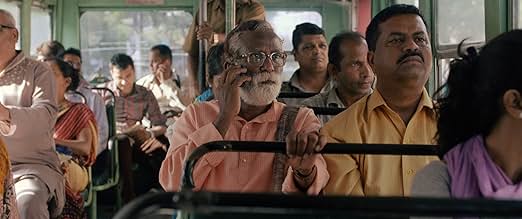
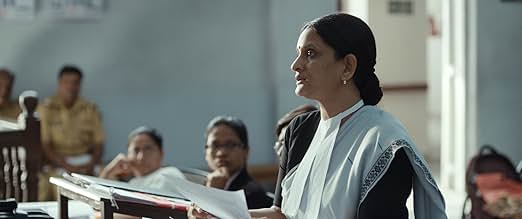
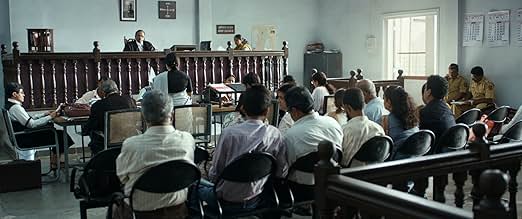
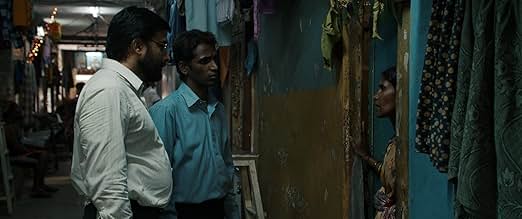
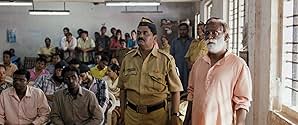












![Peepli [Live]](https://m.media-amazon.com/images/M/MV5BNDc1YTEwYmUtYTIxMC00Mjg4LWJmODctNGNiYjNjMTA3NjY5XkEyXkFqcGc@._V1_QL75_UY207_CR2)


